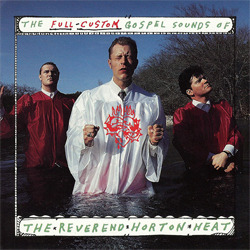Even though most of my writing wrestles with Catholicism, I’m not a Roman Catholic. As I’ve made clear. As a teenager, I made it clear to the administration at my Catholic high school, too. Nonetheless, owing I guess to their saintly Francis-like ecumenism, when I was a senior they let me (a heathen!) run a lecture at the freshman retreat on the subject of music and faith.
I say I “ran” it, but I guess they didn’t trust me all the way, because they had me co-present with a youth leader from a local Catholic church. Still, it was a big event for me, my first experience standing in front of a classroom. I wrote a detailed lesson plan, anticipated questions I might get, even thought of contingency plans in case the school’s CD player malfunctioned.
The youth leader’s presentation was what you’d expect: he tried to sell Contemporary Christian music to the freshmen by convincing them that wholesome music could be cool. I took the opposite tack. My thesis was that the act of taking these bare materials (notes and words and effects) and trying to turn them into something with meaning necessarily takes a sort of faith and that, therefore, music is almost by definition religious. My point was that we can find faith all over in music. For examples, I played Lenny Kravitz and Jimi Hendrix, and I argued that Stevie Ray Vaughan’s version of “Little Wing” is essentially a prayer.
(Listen again if it’s been a while and tell me if you disagree)
I thought of this recently when a friend from those days sent me a link to his new band’s demo, which reminded me a little of a Denton-based band called Slobberbone.
I first saw Slobberbone at the Impala in Fort Worth after my junior prom. In fact, it was the night the Impala opened, and the show had been publicized for weeks. Jello Biafra was going to be there.
Except my date and I got there late, long after Jello had gone, when there were only about ten people left in the Impala’s back room, watching this country-punk band fall apart on stage. The band members seemed beyond drunk. At one point, the bassist, who is about six-foot-ten, just sat down on the stage, while playing, and then tipped over on his back. He kept playing from the floor.
The next day I found their CD, Crow Pot Pie, at CD Warehouse on Berry Street and listened to it almost daily for the next year or so.
I looked them up on Spotify after my friend sent me his demo to see if they sounded the way I remembered. One thing I had forgotten is just how thoroughly Christian language and themes run through their songs. I don’t mean that you can interpret them as Christian if you try—I mean that Christianity is an unmistakable obsession in their lyrics.
In “Stumblin,’ they sing, “So I picked a fight with Jesus Christ / Now I’m thinkin’ I was wrong.”
And in “No Man Among Men,”: “I know I ain’t no man among men / Jesus, I pray you’ll take me in.”
Then, in “Dunk You in the River”: “I finally found a drink to wash away all the world’s sins / And I’ll dunk you in the river once again.”
How did I miss that? I bet I didn’t really miss it, exactly. I think their religious emphasis probably just didn’t stand out. For an Episcopalian acolyte attending a Catholic school in an Evangelical city, hearing about God—even if it was hearing someone reject him—was pretty normal. There was no such thing as secular or agnostic there. The champions of the Fort Worth music scene in those days were the Toadies, who certainly fit Flannery O’Connor’s description of the South: they were God-haunted. Listen to the songs off of Rubbernecker. No word matters more in those songs than Jesus. On the other side of the metroplex, the biggest name in Dallas music was the Reverend Horton Heat, who parodied baptisms on his album covers and exorcisms at his concerts.

But back to Slobberbone. Understand, this is a band I remember as an absolute human train wreck (that I loved!). Their songs are politically incorrect, often violent, occasionally leaning towards a (hopefully) tongue-in-cheek misogyny. In no way am I endorsing them as moral exemplars, anymore than I would endorse Billy Joe Shaver or someone like that. Still, while songwriter Brent Best doesn’t seem to take much seriously, I don’t detect a lot of irony when he’s singing about religion.
And I have no idea what Best’s faith (or lack of faith) is like. I don’t know what Cormac McCarthy believes, either, or what Fyodor Dostoevsky did (I mean, officially he was Orthodox, but c’mon. Don’t you wonder?). When Best sings “He said trust in me I’m the King of Kings, and you my friend are in a rut / But what I was looking for was the King of Beers, so I said won’t you be my Bud” I don’t know if he wants me to cheer or shake my head. But I know that if I’m going to learn anything about religion it’s probably going to come from someone like that: someone who sometimes feels like blowing off Jesus for a twelve-pack of Budweiser. Or let me rephrase that: if you can’t sing about that twelve-pack like maybe it’s the better choice, then I’m afraid we might not be wrestling with the same questions.


